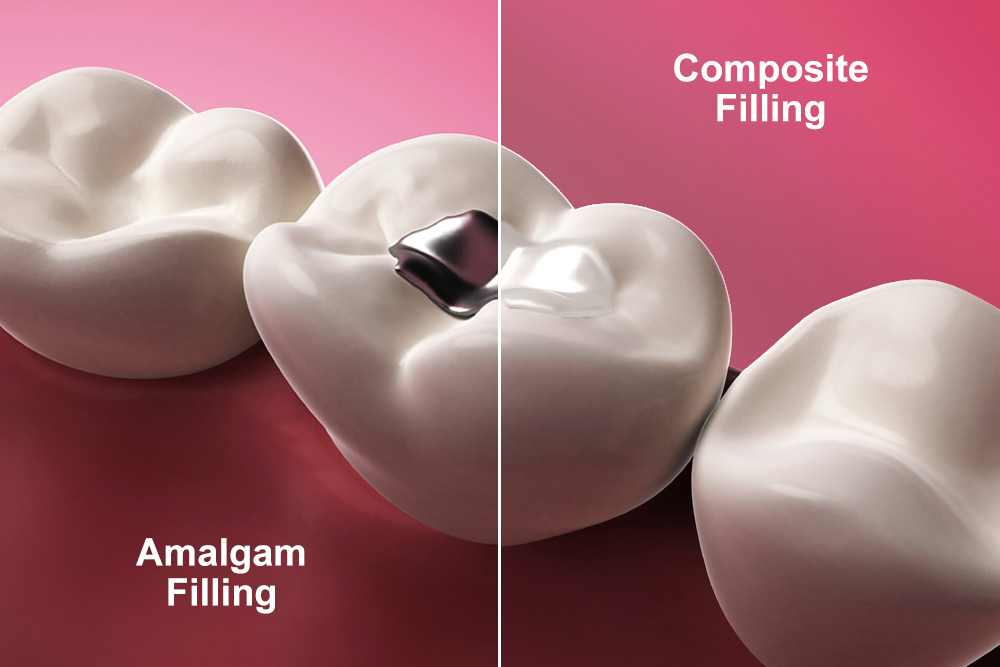Replacing Metal Fillings with Tooth-Colored Composites
Tooth decay is a common concern among Dr. Bruce Wilderman’s patients. With regular dental care, most cases of decay can be diagnosed and treated while they are still in their earliest stages. A dental filling repairs minor to moderate cases of tooth decay and protects the tooth against further complications. In the past, many dentists relied on metal fillings to address decay. Now, composite tooth-colored fillings are Dr. Wilderman’s treatment of choice. Tooth-colored fillings provide strength and protection to teeth compromised by decay, and they do so without detracting from the beauty of the smile. Because of the many benefits of tooth-colored fillings, we recommend these restorations for most dental cavities, and even as replacements for old metal fillings. Replacing metal fillings allows our Philadelphia, PA, patients to enjoy the advantages that tooth-colored fillings have to offer.

When to Replace Metal Fillings
Dental fillings are strong and durable, but they will not last forever. Eventually, the wear and tear that causes the teeth to weaken over time will also compromise the structure of dental fillings. Metal fillings tend to last for a shorter period of time than tooth-colored fillings because they react to changes in temperature. Metal fillings expand and contract when exposed to extreme hot or cold temperatures. This puts pressure on the surrounding tooth structure and, eventually, small fractures may develop. Fluctuations in the metal fillings are also likely to cause the formation of gaps between the natural tooth and the filling. Gaps and fractures will leave the teeth vulnerable to decay and infection. If a metal filling has become damaged, if fractures have formed, or if the filling no longer fits the tooth properly, it is time for the restoration to be replaced.
Metal fillings also have an obvious impact on the appearance of the smile. Many patients have old metal fillings in their mouth because tooth-colored fillings weren’t offered at the time of their initial treatment. Patients who are unhappy with the way a metal filling affects the appearance of their smile may also consider replacement. In most cases, a metal filling can safely be replaced with a tooth-colored composite that will blend in seamlessly with the natural teeth.
Replacement Procedure
The procedure for a dental filling replacement is similar to the procedure used to place a new dental filling. After the tooth has been cleaned, it will be reshaped to accommodate the new dental filling. The old metal filling will need to be removed as well. To ensure that the entire filling is taken out of the tooth, we will need to remove a small portion of the surrounding tooth structure. All of this will be done with the patient under anesthetic, to ensure that the patient remains comfortable throughout treatment. When the tooth has been reshaped and the old metal filling has been removed, we will apply a dental composite directly to the tooth. This material will be shaped to replace the lost structure and seal off the inner layers of the tooth. When we are satisfied with the shape and fit of the new tooth-colored filling, a special dental light will be used to harden the composite and bond it to the tooth.
Benefits
Tooth-colored composite fillings offer our patients several benefits, including:
- Tooth-colored fillings blend in with the natural teeth and don’t detract from the beauty of the smile
- Composite fillings bond to the natural tooth which further strengthens the patient’s bite
- Composite fillings are completely free of mercury and other metals
- Tooth-colored fillings tend to last longer than metal fillings
Contact Us
If you have old metal fillings that have caused damage to your teeth or have compromised the appearance of your smile, you may be an ideal candidate for filling replacement. To learn more about the benefits of tooth-colored fillings, and whether it may be time to replace your metal fillings, contact us at your earliest convenience. We look forward to hearing from you!


